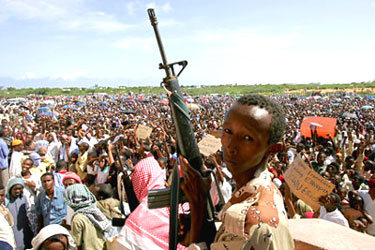Annan: U.S. wrong to support warlords in Somalia
By Saeed Shabazz -Staff Writer- | Last updated: Jun 29, 2006 - 8:58:00 PMWhat's your opinion on this article?
UN trying to clarify problems in Somalia

|

Militia from the Islamic Courts Union stands over a crowd in Mogadishu, June 16, during a demonstration against a proposed peacekeeping mission to Somalia. About 10,000 people demonstrated Friday against a proposal for a peacekeeping mission in the Somali capital, now controlled by Islamic militia who also hold most of the country's south. Photo: AP/World Wide Photos
|
The Inter Press Service (IPS) reported that Congolese President Denis Sassou Nguesso, chair of the African Union for 2006, also criticized the support given by the U.S. to the warlords, during a visit to Washington on June 6. “We think, and we told President [George W.] Bush, that the most important thing is to establish a government that must help the Somali people to have a real government,” Pres. Nguesso told IPS.
The U.S. funding of the warlords surfaced on June 5, when the Union of Islamic Courts reported that they had taken control of Somalia’s capital city, Mogadishu, from the Alliance for the Restoration of Peace and Counter-Terrorism, the umbrella group, allegedly supported by the U.S. funds.
“We certainly want to work with people in Somalia who are interested in combating terrorism,” said Sean McCormack, State Department spokesman. “We do have concerns about the presence of al-Qaeda in Somalia,” he added. But he stopped short of admitting or denying that the Bush administration was supporting the warlords. Observers note that for the U.S. to admit to funding the warlords would place them in violation of the UN arm’s embargo against Somalia. A UN panel monitoring the embargo said in a recent report that it is investigating an unnamed nation’s alleged support for an alliance in Somalia that has received large supplies of weapons.
U.S. officials are, however, saying that they fear the Union of Islamic Courts will offer safe haven to al-Qaeda and other radical Islamic groups as the Taliban did after it took control of Afghanistan. When asked by a reporter if the Islamic Courts taking control in Mogadishu was a good thing, Mr. Annan said, “I don’t know much about the Islamic Court group. What I can say is that the people of Somalia are totally fed up with the warlords, that I suspect that most Somalis, except those with a vested interests, will say good riddance.”
Analysts such as a specialist at the Congressional Research Service are saying the “so-called Islamists” provide a sense of stability in Somalia, according to the New York Times. Experts tied to the Council on Foreign Relations say the most effective counter-terrorism strategy for Somalia is one that “seeks to establish a stable government, as well as an environment in which civil society organizations and moderate Muslim organizations can flourish.”
According to the UN, Somalia’s population as of 2005 was 10.7 million, who are mostly Muslim. “The United States must promote good governance throughout the Horn of Africa by strengthening diplomatic understanding of the area,” writes Robert Rotberg, president of the World Peace Foundation, in his book, “Battling Terrorism in the Horn of Africa.”
On June 15, the U.S., United Kingdom, Sweden, Italy, Tanzania, Norway, an observer from the European Union and an observer from the African Union met at the Norwegian Mission to the UN, according to the State Department, to “seek a practical solution” to the Somali problem. U.S. Assistant Secretary of State Jendayi Frazier represented the State Department at the meeting for African Affairs. The only statement issued by the group, known now as the “Somalia Contact Group” after the meeting, said: “There is an urgent need for increased humanitarian assistance and improved protection for the civilian population.” The British ambassador to the UN, Emyr Jones Parry, said, “It’s incumbent upon the UN to tackle the Somali problem.”
However, the UN was not represented officially at the contact group’s first meeting. When asked by a reporter if the UN felt sidelined, now that the U.S. had taken the initiative, and if he had a plan for the Somalis, Mr. Annan responded: “We cannot have a plan for them; we have to have a plan with them (Somalis), and discuss it with them.” He further stressed that, “What is important is that we get the Somalis to work together first; and if need be, when they ask, the international community may step in.”
Bush Hawks Down in Somalia (FCN, 06-21-2006)
INSIDE STORIES AND REVIEWS
-
-
About Harriett ... and the Negro Hollywood Road Show
By Rabiah Muhammad, Guest Columnist » Full Story -
Skepticism greets Jay-Z, NFL talk of inspiring change
By Bryan 18X Crawford and Richard B. Muhammad The Final Call Newspaper @TheFinalCall » Full Story -
The painful problem of Black girls and suicide
By Charlene Muhammad -National Correspondent- » Full Story -
Exploitation of Innocence - Report: Perceptions, policies hurting Black girls
By Charlene Muhammad -National Correspondent- » Full Story -
Big Ballin: Big ideas fuel a father’s Big Baller Brand and brash business sense
By Bryan Crawford -Contributing Writer- » Full Story






 Click Here Stay Connected!
Click Here Stay Connected!








